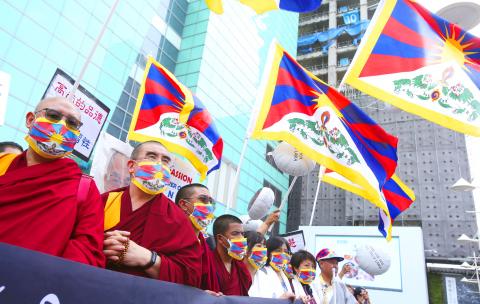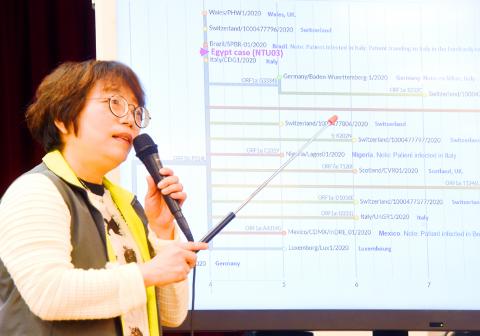Taiwan reported no new cases of COVID-19 yesterday, as the Central Epidemic Command Center (CECC) said that DNA sequencing on the woman who is the nation’s 39th case indicated that she had contracted the virus during a trip to Egypt.
Minister of Health and Welfare Chen Shih-chung (陳時中), head of the center, encouraged Taiwanese to avoid unnecessary travel abroad, saying that the global COVID-19 situation is still concerning, as confirmed cases have been reported in 94 nations, including a total of 7,751 people in Asia, excluding China; 9,365 in Europe and 6,127 in the Middle East.
“The center will continue to pay close attention to the situations in these affected countries and issue travel notices accordingly,” he told a news conference.

Photo: Chiang Ying-ying / AP
“Taiwan is now in 30th place in the number of confirmed cases in each nation, meaning there are 29 countries that have reported more cases than us,” Chen said. “Being in Taiwan is relatively safe, so people should avoid visiting places with a greater risk of infection.”
The Egyptian Ministry of Health and Population and the WHO’s regional office on Friday reported a Taiwanese-American woman who took a Nile River cruise as the “index case” of a dozen people on the ship who later tested positive for COVID-19, creating confusion in international media, with some reports calling the woman the “source of infection.”
The woman, who is in her 60s and is Taiwan’s 39th case, developed a sore throat and cough when she visited Dubai and Egypt between Jan. 29 and Feb. 20. She returned home on Feb. 21, and tested positive on Feb. 29.

Photo: Chu Pei-hsiang, Taipei Times
The center on Saturday said a local tour guide was the first from the cruise to develop symptoms, and that DNA sequencing of samples of the virus collected from the woman proved that she had contracted COVID-19 in Egypt.
Yeh Shiou-hwei (葉秀慧), a professor at National Taiwan University’s College of Medicine, said conducting a phylogenetic analysis of the DNA sequence is similar to conducting a “paternity test” on the virus, and the result showed that the virus that the woman contracted was different from the four main DNA sequences found among the other confirmed cases in Taiwan.
The sequence was very close to a clade (line of evolutionary descent) found in Europe, mainly in Italy, but also in cases reported in the UK, Luxembourg and Finland, Yeh said.
Three DNA sequences in the same clade have also been found in Brazil, Mexico and Nigeria, but the people had traveled to Italy, she added.
“The analysis clearly shows that the woman did not contract the virus in Taiwan, but in Egypt and brought it back to Taiwan,” Yeh said. “Science can tell us that the source of infection was not the Taiwanese woman.”
Meanwhile, Chang Shan-chwen (張上淳), convener of the center’s advisory specialist panel, said three more of the 45 confirmed cases in Taiwan were discharged from hospitals yesterday, bringing the number of recovered patients to 15.
The three were the nation’s 18th, 26th and 29th cases, who were all asymptomatic cases and part of three family clusters of infection, Chang said.

The Taiwanese passport ranked 33rd in a global listing of passports by convenience this month, rising three places from last month’s ranking, but matching its position in January last year. The Henley Passport Index, an international ranking of passports by the number of designations its holder can travel to without a visa, showed that the Taiwan passport enables holders to travel to 139 countries and territories without a visa. Singapore’s passport was ranked the most powerful with visa-free access to 192 destinations out of 227, according to the index published on Tuesday by UK-based migration investment consultancy firm Henley and Partners. Japan’s and

NATIONAL SECURITY THREAT: An official said that Guan Guan’s comments had gone beyond the threshold of free speech, as she advocated for the destruction of the ROC China-born media influencer Guan Guan’s (關關) residency permit has been revoked for repeatedly posting pro-China content that threatens national security, the National Immigration Agency said yesterday. Guan Guan has said many controversial things in her videos posted to Douyin (抖音), including “the red flag will soon be painted all over Taiwan” and “Taiwan is an inseparable part of China,” while expressing hope for expedited “reunification.” The agency received multiple reports alleging that Guan Guan had advocated for armed reunification last year. After investigating, the agency last month issued a notice requiring her to appear and account for her actions. Guan Guan appeared as required,

Japan and the Philippines yesterday signed a defense pact that would allow the tax-free provision of ammunition, fuel, food and other necessities when their forces stage joint training to boost deterrence against China’s growing aggression in the region and to bolster their preparation for natural disasters. Japan has faced increasing political, trade and security tensions with China, which was angered by Japanese Prime Minister Sanae Takaichi’s remark that a Chinese attack on Taiwan would be a survival-threatening situation for Japan, triggering a military response. Japan and the Philippines have also had separate territorial conflicts with Beijing in the East and South China

A strong cold air mass is expected to arrive tonight, bringing a change in weather and a drop in temperature, the Central Weather Administration (CWA) said. The coldest time would be early on Thursday morning, with temperatures in some areas dipping as low as 8°C, it said. Daytime highs yesterday were 22°C to 24°C in northern and eastern Taiwan, and about 25°C to 28°C in the central and southern regions, it said. However, nighttime lows would dip to about 15°C to 16°C in central and northern Taiwan as well as the northeast, and 17°C to 19°C elsewhere, it said. Tropical Storm Nokaen, currently